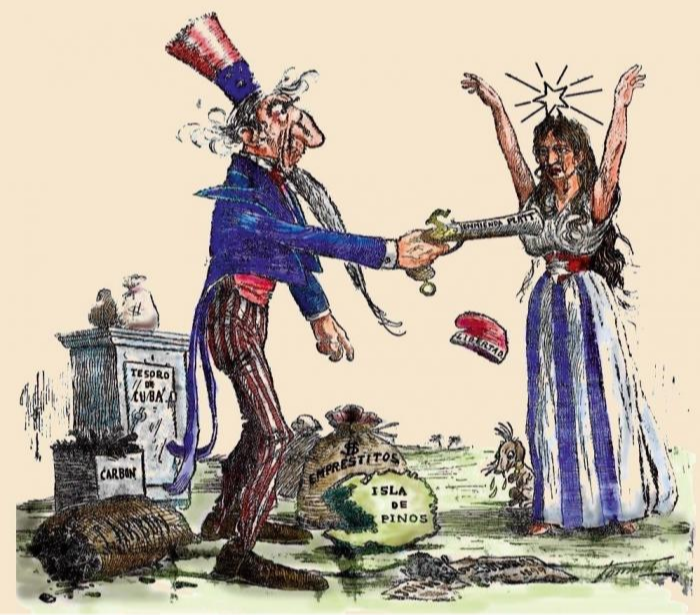
One hundred and twenty-one years ago, the intentions of the United States towards Cuba became clear when it proclaimed, on May 20, 1902, a mediatized republic that made a mockery of the national independence sentiment, since what was born was a neo-colony of the incipient empire of the revolted and brutal North that despises us.
The hoisting of the national flag in the old Palace of the Captains General in Havana ended the military occupation of the United States, but imposed a government submissive to its interests, due to the imposition, in the Constitution of the Republic, of the Platt Amendment, which tied the country to the mandates of Washington.
The leader of the Cuban Revolution, Fidel Castro Ruz, would point out years later that "the worst thing about the Amendment was the hypocrisy, deceit, Machiavellianism and cynicism with which they drew up the plan to take over Cuba".
The pretext of the timely and mysterious explosion of the battleship Maine in Havana Bay, tried to "justify" the U.S. intervention to the world when the Spanish metropolis could no longer sustain the war, neither militarily nor economically, in the face of the booming Cuban Liberation Army.
The occupation was a hard blow to the independence for which the Cuban people had fought for more than 30 years against Spanish colonialism, and whose war was practically won.
With deceit and false promises, they snatched the triumph from the Mambises and did not even allow them to enter Santiago de Cuba.
When he was prevented from entering the eastern capital to participate in the Spanish surrender in 1898, under the pretext of possible revenge by the Cubans, General Calixto García addressed a strong protest to U.S. General William Shafter.
The U.S. military occupation, "legitimized" before the powers of the time by the Treaty of Paris of December 10, 1898, allowed the U.S. to formally enter into possession of Cuba on January 1, 1899.
John R. Brooke was imposed as military governor and divided the country into seven departments, leaving at the head of each one a general of the army of occupation, reserving for himself the supreme authority.
The other occupation began immediately, the economic one, with the penetration of American capital in sectors such as the tobacco, sugar and mining industries, in open competition with British economic interests on the Island.
On December 20, 1899, General Leonard Wood, governor of Santiago de Cuba, replaced Brooke as governor of the island, strengthened U.S. domination over the economic sectors and proposed to "Americanize" Cuba by means of a prolonged occupation.
The rigged presidential elections of 1901 were a vivid example of Washington's manipulation. Generals Máximo Gómez, who led the Cuban independence forces; and Bartolomé Masó, also linked to the contest, withdrew their candidacies due to the distortions of the process, and Tomás Estrada Palma was elected president, who had succeeded José Martí as Delegate of the Cuban Revolutionary Party (PRC), to fight for independence.
Estrada Palma, after the Yankee occupation, dissolved the PRC, closed its newspaper Patria, and was an important factor in the demobilization of the Liberation Army and the leadership bodies of the Revolution, which facilitated the tutelage of the great power and even a possible annexation of the Island.
On May 20, 1902, the patriot linked to the liberating deed of 1895, Juan Gualberto Gómez, warned the Cuban people, in the magazine El Fígaro, that "more than ever it is necessary to persist in the claim of our mutilated sovereignty; and to reach it, it is necessary to adopt again in the evolutions of our public life the guiding ideas and the methods that Martí advocated".
The outgoing military governor, Leonard Wood, then declared, without embarrassment or shame that, "of course Cuba has been left little or no independence by the Platt Amendment, and the only thing indicated now is annexation. It is quite evident that it is absolutely in our hands. With control, which will undoubtedly soon become possession, we shall shortly practically control the sugar trade of the world. The island will gradually become North Americanized and in due time we will have one of the richest and most desirable possessions in the world.
Close to the end of his term as president, Estrada Palma decided to be reelected, for which he used the force of power and fraud.
This motivated the followers of the Liberal Party to take up arms. When he realized that the popular revolt threatened to overthrow him from power, he preferred to ask the Yankee Government for a new military intervention.
For almost three years, between 1906 and January 28, 1909, the island was once again under U.S. military administration.
In the elections called by the second military intervention, on November 14, 1908, José Miguel Gómez was elected, and his government carried out a violent repression against the Independent Movement of Color, in 1912.
It would not be until January 1, 1959, with the triumph of the Cuban Revolution, that the Island would conquer its definitive independence against the same enemy that has been trying to dominate it for more than a century. Attempts that have failed and will continue to fail due to the independence will of its people.

